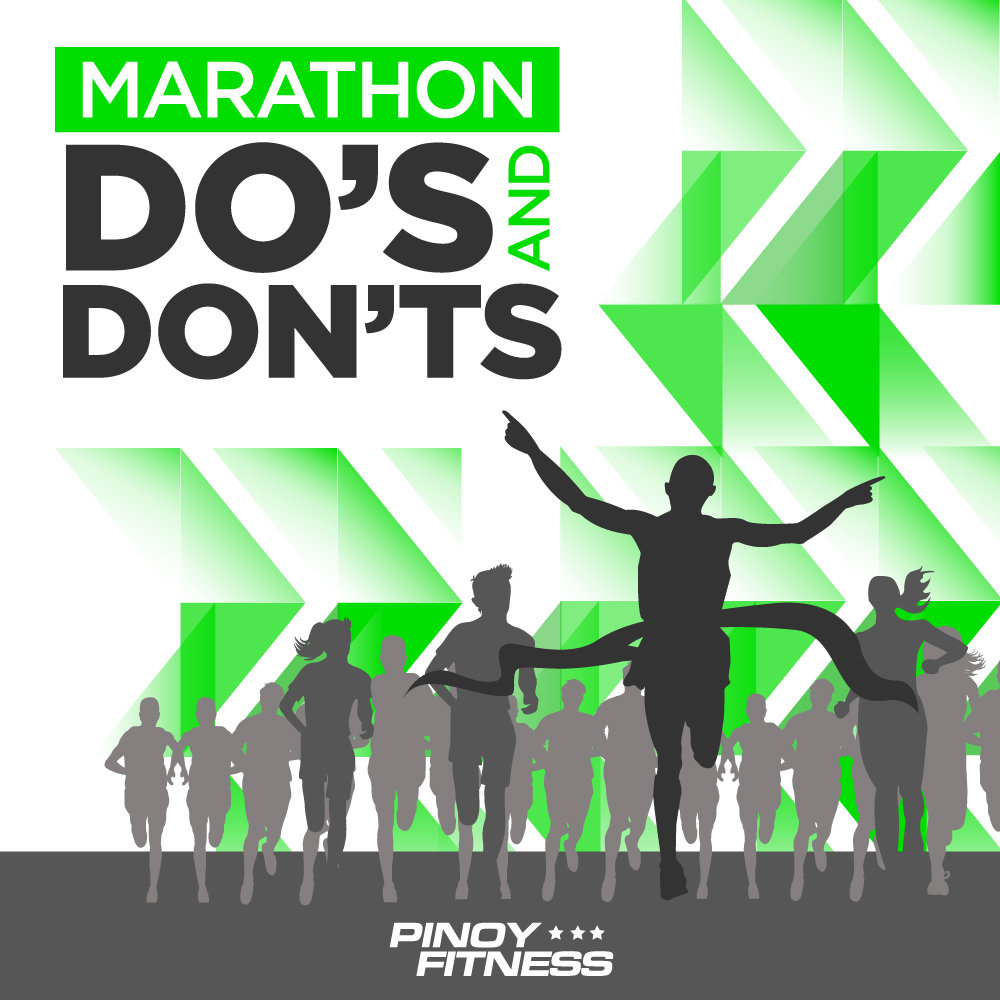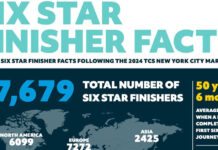
Running a marathon is a challenging yet rewarding experience that requires the right mindset and preparation. In this article, we will explore key do’s and don’ts for running your first marathon. By following these guidelines, you can ensure that you are physically and mentally prepared for the race, enabling you to complete it safely and successfully.
42K Do’s:
- Train, Train, Train! – A marathon is no easy feat. Dedicate ample time and effort to your training. Consistency is key, so stick to a well-structured training plan that gradually increases your mileage and incorporates rest days.
- Enjoy the Journey – Don’t stress about your finish time. Embrace the experience and believe in your ability to complete the race. The journey is as important as the destination, so take in the sights, sounds, and atmosphere of the race.
- Value the Experience – Marathons can be costly, so make the most of every moment! From the camaraderie with fellow runners to the thrill of crossing the finish line, savor each aspect of the race.
- Complete a 32K Training Run – Ensure you’ve finished at least one 32K run during your training. This long run will build your endurance and give you the confidence to tackle the full marathon distance.
- Wake Up Early – Set your alarm for three hours before the race to give yourself ample prep time. This ensures you can wake up, eat, and get ready without feeling rushed.
- Have a Pre-Race Breakfast – Eat breakfast two hours before the race and consume an energy gel 15 minutes before the start. Choose easily digestible foods to avoid stomach issues during the race.
- Test Your Nutrition Plan – Train with the same energy gels you plan to use on race day. Experiment with different flavors from the same brand to avoid monotony. Schedule your nutrition intake during the race to keep your energy levels steady.
- Rest Up – Take it easy the week before the race. Aim for 7-9 hours of sleep each night, especially in the final two nights. Rest allows your body to recover and be in peak condition for race day.
- Prevent Chafing – Apply Bodyglide or petroleum jelly to areas prone to chafing. Common spots include underarms, inner thighs, and around sports bra or heart rate monitor straps.
- Maintain a Steady Pace – Don’t hesitate to walk if needed. Walking is a perfectly acceptable strategy in marathons, especially if it helps you conserve energy and avoid injury.
- Smile for the Camera – Enjoy your moment! Practice your finish line pose and smile for the cameras. These photos will be cherished memories of your achievement.
- Wear Comfortable Gear – Ensure your race day attire, including sunglasses and visors, is comfortable and well-tested. Avoid wearing anything new that you haven’t trained in.
42K Don’ts:
- Procrastinate Training – Stick to your training plan and avoid last-minute cramming. Inconsistent training can lead to injury and burnout.
- Drink Alcohol During Rest Week – Avoid alcohol to ensure optimal performance on race day. Alcohol can dehydrate you and negatively impact your sleep and recovery.
- Overeat on Race Day – Keep your breakfast moderate to avoid discomfort during the race. Stick to familiar foods that you know your body can handle.
- Consume Spicy or Oily Foods – Steer clear of spicy foods two days before and oily foods the night before the race. These can cause digestive issues that you don’t want to deal with during the marathon.
- Wear New Gear – Avoid trying anything new on race day, including shoes and clothing. Stick to what you’ve tested in training to prevent blisters and discomfort.
- Overhydrate – Balance your hydration with energy gels and sports drinks to avoid bloating. Overhydration can lead to hyponatremia, a dangerous condition where your blood sodium levels become too low.
- Race the First 32K – Pace yourself for the first 32K. Save your energy for the final 10K, where the true marathoners shine. Starting too fast can lead to burnout and exhaustion.
Post-Marathon Tips:
- Refuel Immediately – Consume at least 500 calories within 30 minutes of finishing to kickstart recovery. Chocolate milk or a protein shake is ideal. This helps replenish glycogen stores and repair muscle tissue.
- Short Recovery Run – Do a short, gentle run a day or two after the marathon to flush out lactic acid. This can help reduce muscle soreness and speed up recovery.
- Enjoy Your Post-Race Appetite – While you can indulge, be mindful of your food choices to avoid unnecessary weight gain. Opt for nutritious foods that aid in recovery.
- Resume Training Gradually – After a two-week recovery, ease back into training. If running feels challenging, switch to low-impact activities like swimming, biking, or kayaking. This helps maintain your fitness without putting stress on your joints.
- Stay Motivated – If you feel sluggish, take a break and plan your next race. Enjoy shorter races and aim to beat your personal records. Setting new goals can keep your motivation high.
- Embrace the Lifestyle – Remember, marathon running is more than a sport—it’s a lifestyle. Incorporate running into your daily routine and continue to set new challenges for yourself.







I know its not easy to go on a marathon, thats i why i needed more time for my training and i want to improve my pace in every races i will join,im taking it slowly and make sure not to skip each category. Will take my 32k on RU3 so wish me luck.Will train hard on a 21k marathon when i get my sub2 or less then will level up to a higher category.Thanks for the info.
very well said. thanks a lot for posting !
i needed that…tnx
thanks for the tips. it is helpful to me as a running enthusiast.
tnk for the tips
thanks for the post…two thumbs up :)
this article is indeed really helpful esp to aspiring marathoners. many thanks for plucking this topic out from the Comm Forums, Mr. PF!
and credits go to Mr Mikey Macainag, your very good friend/trainer/seasoned marathoner who did not hesitate coming up with these tips upon my request.
My 1st marathon was this years Condura Marathon. Akala ko hindi totoo un wall, dati di ako naniniwala dun tapos bumanga ako sa wall! Totoo ang wall! Mag ingat sa wall! Wag bumilis agad mag negative split also wag mag kulang sa gel at lalo na sa training! Happy Training!!!
TUMPAK!!!!!!!
Thanks for the tip. Now I know things that I should do, undo and not do.
Thanks for the good info, hope to start my 1st Hail Mary…
how about 21K tips, do’s and don’ts?
Never in my wildest expectation that I can ran & finished 26.2 miles….at aged 60 the free Press Detroit International Marathon on October18,2009,Detroit,Michigan,USA.The moment your physical capabilities starts breaking down at miles 19 to 21,( called “the walls” in Marathon running)….stop,walk & do some funny stuffs…like doing the “Michael Jackson moves”…infront with expectators….you’II find yourself more amusing & appreciated…more than the rest & at the same time,regaining your mental “toughness & focus”.Everyone are different……be creative reserving that remaining strives to the finish line!!!.
Well done … as they say mental toughness is a must, specially after 20 miles …
It enlighten me. Thanks for all Tips. Very informative :)
wow, big help to kasi i been planning to do a full marathon this year… i have done a lot of half marathons already. i think it’s about time
aus to… planning for fm this year
Not ready for the FM but i’ll take it also for me to prepare my 3rd half FM.
thanks for the post.
May mga Dont’s ako na nagagawa now i know na bad yun. hehehe!
ayuzz din yung additional tips!
Thanks for the post,.
This is true and effective.. Proper training ,conditioning and Discipline are the best thing to do for preparation for the race and to get rid away from further injuries.. RUn safe and be wise.. godbless runners!
Thanks for the post! It motivated me to lose weight. :))
How far off should be the period between marathon? I’m planning to sign up for my first fm on rupm this october but i also want to do condura next year. I’m just not sure if it is safe to do both
There’s no rules that I know off but they say 2 marathons a year is the max if you want to perform better, My first marathon is October 2012. I run my 8th marathon just last Saturday 21st of September after running another one on the 14th of September. Not a good idea to do 2 marathons in 2 weeks, but glad that I did it. I am a slow runner and really don’t aim for the time but more on the enjoyment and endurance of the sport. So if you can have 18 weeks gap you should be fine … for me 3 weeks rest will be fine, I just keep in my mind that it will just be another long run. If you will ask why I am doing too much, I am training for a back2back in February means 2 marathon in 2 days. keep on running.
i had a mild stroke feb 2011 but i’m doing 5k runs now…you think i could train for 21k & eventually do 42? where could i train, if ever?
very nice tips….try ko gawin kasi wala akong masyadong oras para mag train… maraming trabaho…. may ginagawa akong intervals para tumagal ng konte yung pace ko… will try to join the rexona run and 32 k run ng unilab leg 3… in preparation for my 42k …hope mag survive…thank you… its more fun when we run… he he he
Ms_Mars… kita kits uli sa rexona at rununited leg 3 para makuha yung 3rd part ng medal natin… malapit na dalawa na lang…
Tanung ko lang sana if there is such a training for 4 weeks for a full marathon with the objective of finishing the race for 3.5 hours? Salamat ha!
i am an active runner this year meaning i joined fun run almost every other month….. ran three 10Ks; three 16 Ks ( last of which is the adidas kotr ) ran two 21k (ru2 and rexona )…… and will run in ND 25K and 21K qcim this dec 2…….. my question is, is this enough as i would like to run for full marathon this feb 2013……………. any advise? esp for training? i hope the veterans could help..i have 2 1/2 months to prepare…….more power and god bless us all…thanks in advance…
@drukidlat comment 25
try mong maka training run longer than 32km , slower na konti sa target na pace mo sa first 42km… This must be done before the year ends…
By january, sa opinion ko lang, mag start ka nang mag baba ng mileage, 21km max first two weeks, tapos mga 15kms na lang sa 3rd at 4th week ng January.
Ingat sa training at bawal tamad … :-p medyo gipit na sa oras eh.
I also recommend adding more kms on qcim… pwede namang ituloy ang takbo pagkatawid ng finish line… 25 to 30… para sakto ang 32km mo last 2 weeks ng 2012.
sana makatulong
thanks a lot for the tips…
wow thanks for the info. im preparing for my full marathon this year, it enlighten me more..
this helped a lot, and I have proven one of the “Don’ts” that you listed: wearing anything new in the race. Had a new camelback during my recent 42k, slowed me down during the race bec. of the weight. but, the training payed off and finished strong. could have finished faster if i didn’t bring that bag, but…doesn’t matter. lesson learned
I just run last 2013 Sundown Marathon here in SG I don’t have any training at all but I finished my race (^^,) Just focus, play what best music you want and enjoy the race.
Go Team Fatbird (^____^)
Hi,
Sorry I did not quite get this?
tnx.
Ivan
6. Race the first 32k. Race the last 10k! This is where the runners and the marathoners are separated.
Read more: https://www.pinoyfitness.com/2011/09/42k-dos-and-donts-before-running-a-marathon/#ixzz2ZP7x1XAd
don’t race the first 32k, race the last 10k …
most of the events i’ve joined, i only ran for 5K categories. i only ran for a 10K once, finishing it in 67 minutes (so shy of it), and i’m planning to go for several 21Ks next year. any tips? how should i train?
Noted.Thanks for the tips. ;)
Do’s no.12..I LOVE IT…aHAHAHAHA
Nice tip! Thanks! ^_^
Bryan Mark Francis… lolz
Joseph Dennis Ledesma Flores
Boss Jerome Hernandez Macatangay Allison Pinza gudluck! U0001f60a
Roger Gadaingan:-)
Rommel Cena…this could help.
Gladys Santiago
Ralph Arnobit
Gary Martin Pascual
Arojo
Ly-ann Vale you should do this.
Great tips; will remember these.
Marie Ayo :)
Check out the photos from Diadora Philippines’ photo booth at PAL Manila Marathon 2015. ;)
LINK: https://www.facebook.com/media/set/?set=a.981380981906668.1073741838.349715688406537&type=3
Worth reading ;)
Yes first marathon ko sa RUPM.sana magka medal ako para maganda starting ko..
26.2 virgin here
Ate Grace Gonzales Abogado, rule no.12
Not a marathon runner.. But after this..
I will be..
Yeah!!!
First time ko din. Sana maayos kong matapos
couz Christopher Escobia Ogayre..:)
Exactly… Will said…
Ok to for Sunday kahit half marathon lng :) Gierod Manuel S. Alejandro Carlito Gonzales Ivan Stephen Llarena Jayson Floranda Whanglou Buensalida Thess Valerio Ferrer Beejay Carlo Jao-chico
#12 practice your finish line pose. John Capino. gud luck!
1st 21km.U0001f648U0001f648U0001f648U0001f648U0001f648 kabado.U0001f616U0001f616U0001f616U0001f616U0001f616
Karen Almanzor #2 for usU0001f604
Good luck Lighthouse runners Nino Lopez Fernando Dellosa Ballesteros Marc Stevens Aggarao Pasicolan Tantan Jepoy atbp
Gilbert, Rey, Igo.. tips pre.. :)
syempre yun pinaka-importante, kaso makuha ko pa kayang mag-smile pagdating sa finish line? hehehe
Thanks coach Gerry!!
1st 42km ko sa sunday..excited nq!
mg 1:1 ka na sa start pa lng.. kaya yan..
Mga paps, ano maganda oras sa mga newbie tulad ko na hindi naman nkakahiya?
Goodluck to all 42K 1st timer. Just put your mind and your body into it, BELIEVE that you can do it even if you have to crawl and then savor the satisfaction the moment you crossed that finish line. Let us all enjoy and have a safe run.
VonStephenVergara enjoy mo lang ung run “finish strong”
1st tym sa 42. Goodluck po sating mga 1st timers at lalo na sa mga hindi masyado nakapag training like me. No PRs. Enjoy lng ntin! :)
Eto un sinusunod ko Ronnell RunNurse Peji
nbsa ko n yang ate shirley. dami besea ko binasa haha ty sa pag tag
sa mga tatakbo ng first time ng 42 sa sunday tulad ko, good luck mga sir/ma’am. start strong finish stronger! U0001f4aa
Wag ka magduda sa sarili mo. Isipin mo exam lang yan. Kaya mo naman ipasa. Take a rest before the event para di mablackout kinabukasan.. (reminder lang) :) Di ka nag-iisa normal na kabahan bago magmarathon. Kahit 5 beses na ako finisher nun, kinakabahan pa din.. May halong excitement din.. Heheh..
It’ll be my first time and running despite of my plantar fasciitis U0001f62dU0001f62dU0001f62d Good Luck to all of us!
Mary Joy Reyes Bathan hahahahahaha.. i’m ready.
5k sub30 muna hahaha try ntn 2017.
3k lang nmn ako haha maliit na bagay
naks.. hahaha! nde naman masyado mayabang ha..
better safe than sorry sabi nga nila.. Frenzel S Avecilla.
have a great and super fun run.. =)
Haha joke lang un :p excited na ko.salamat ;)
#Facebook#Twitter#Instagram#Youtube#GooglePlus#Photos#Google#Chrome#Maps • #Android#Apps#GooglePlay
dad Redg Gallardo, Ryan Vasquez >.
Thanks Joyce! This is it na gid!!! Good luck this weekend!!! Enjoy running for our heroes on the Skyway!!! :)
Woohooo! Yes! This is it!! Thanks Pam!😊 pls pray for me.☺
Liezl Lgrdz Godbless sa run:)
Balak ko pa sana bumili shoes bukas wahahaha..mali mali! Thanks buddy!
hahaha… next run na tayo bumili sabay tayo.kapag kasama na ko sa 21k :))
Read this Mike de Vera!!!
Doinks Pecson para sayo..
I’ve some idea of running. Thank you for posting thia important tips.
I think one important item was missed out in the “DOs” segment, which I believe is just as important as the physical and other logistical preparation, and that is the mental preparation. Perhaps that is implied. Mental preparation means understanding your pace when you’re running different distances, be it a 10K or a half-mary, and relating it to how you would possibly run the 42K monster. At which minute or hour mark do I get tired in a 21K race? How do I extrapolate or project that to a 42K++ distance?
Mental preparation means looking at the map over and over again and memorizing/projecting at which point in the map you could possibly after one hour or two hours. If I finish a 21K at 2.5 or fewer hours, could I possibly finish 42K in 5 hours or just under it? What sort of adjustment in terms of pace should make?
Mental preparation also continues during the race. Talk to yourself and be aware of where your body and mind are at during the race. I’ve run for 2 hours and I’m just past the 18K mark. Can I still make it? This is where memorizing the route by looking at a map repeatedly and doing a dry run in your head may help. It becomes more challenging if you do not have a physical image or visual representation of far more you need to go before you reach the finish line.
Running a 32K first as a suggestion is critical because 32K is regarded as the “wall” even professional runners hit when they’re doing 42K. If your body is a battery, bigla kang low batt sa 32K. One way to overcome the wall is having a very good mental preparation